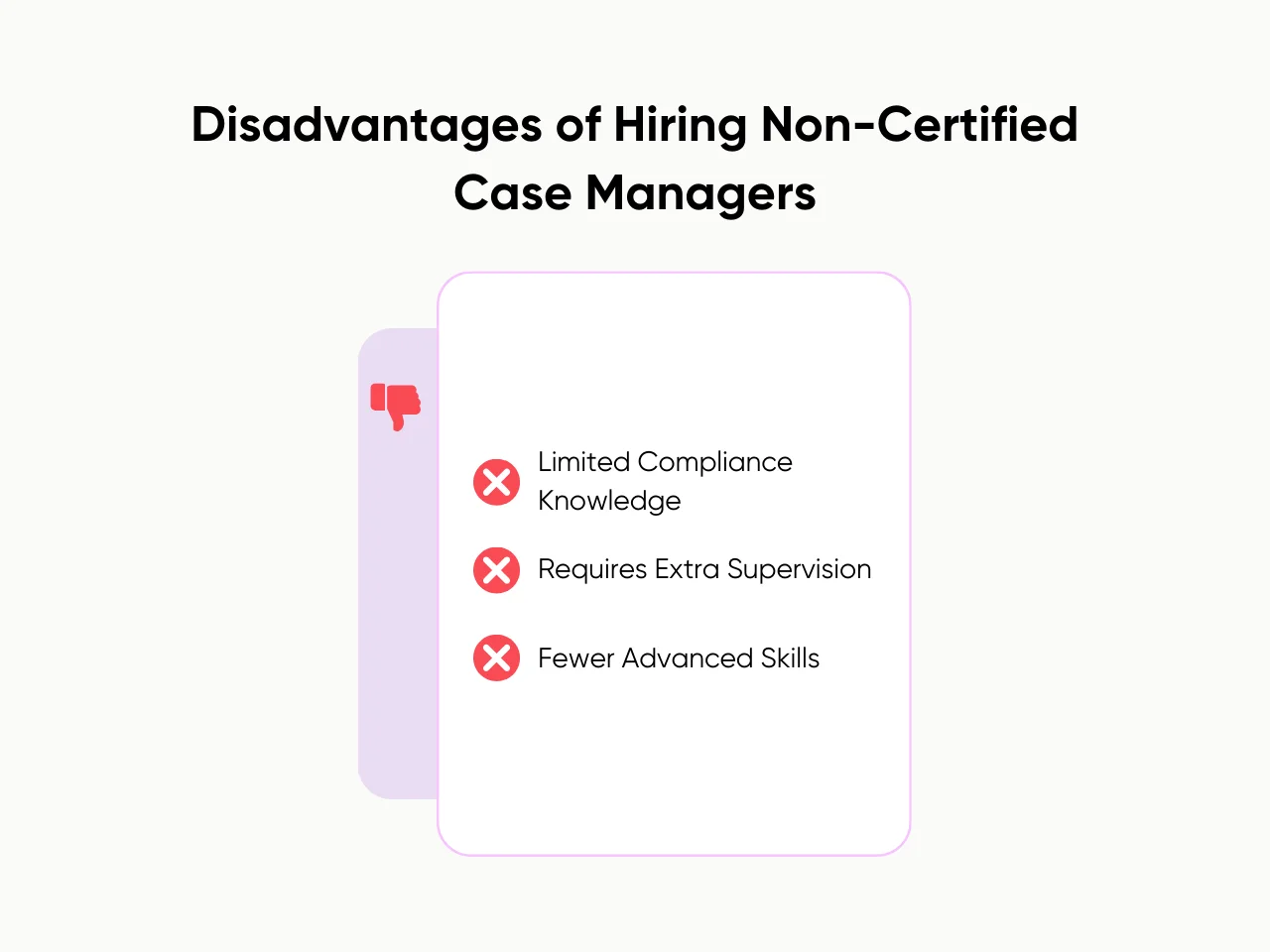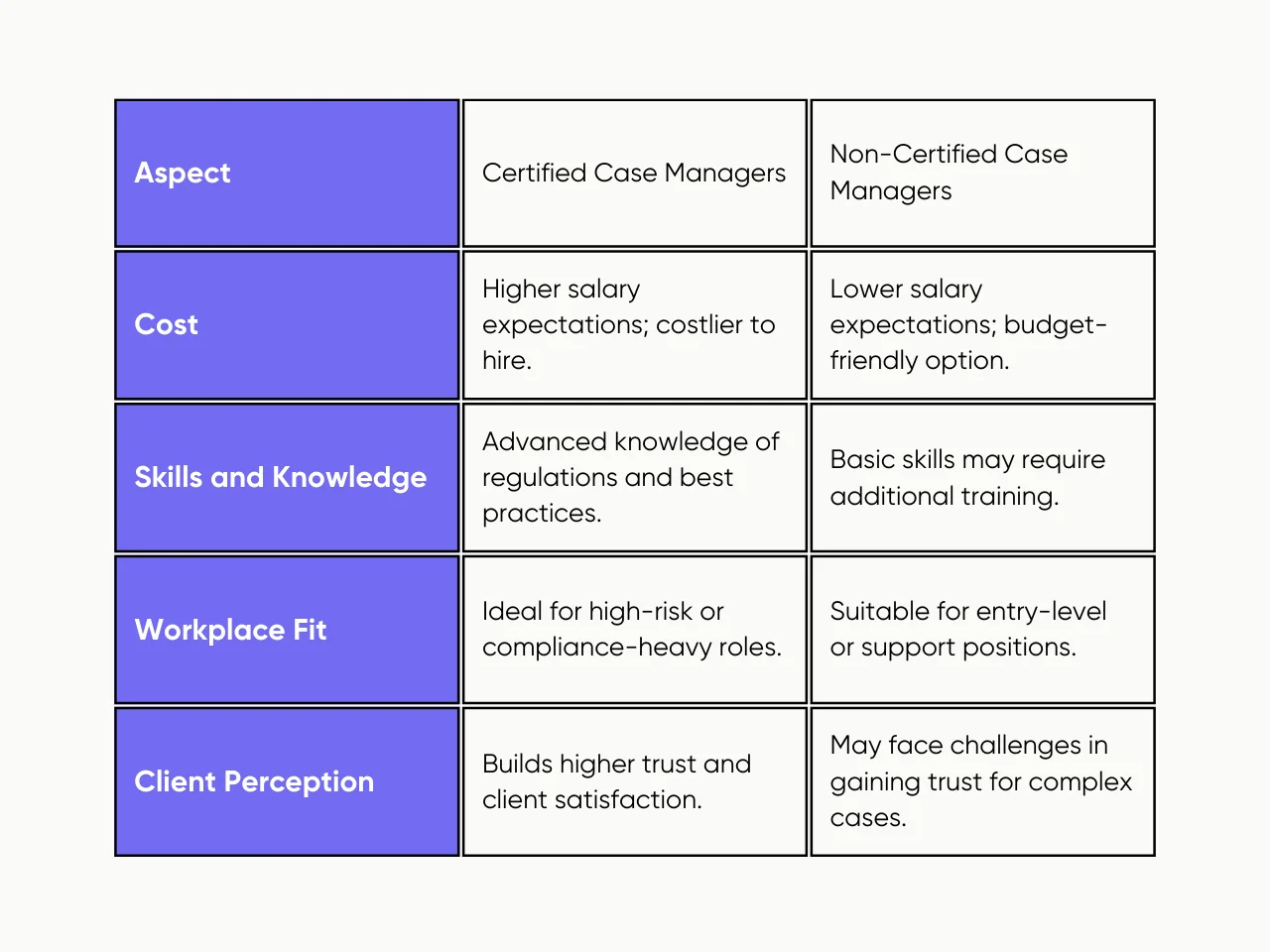Catena is now Pearl Talent! Same mission, new name.
Case managers are important in coordinating care and support for individuals in need. They work in healthcare, social services, and more, ensuring clients can access the right resources. Some case managers are certified, showing extra skills and knowledge, while others rely on experience and education. Understanding the differences between certified and non-certified case manager requirements is essential for organizations and individuals.
At Pearl Talent, we specialize in hiring the top 1% of overseas talent while saving you up to 60% on salaries. We pride ourselves on vetting candidates more aggressively than anyone else, ensuring you get the hardest-working, most motivated professionals. As the most prestigious source of talent from the Philippines and Latin America, we connect you with candidates who excel in modern software skills and perfect English.
Through our industry knowledge and expertise, we created this guide to share the differences between certified and non-certified case managers. These distinctions can help you make informed decisions for your organization or career. Ultimately, you’ll understand which option best suits your needs and goals.
Let's dive in!
Certified Case Managers (CCMs): Requirements and Advantages
Case management is vital in healthcare, social services, and other industries. Case managers help individuals navigate complex systems, ensuring they receive the necessary care and services. Certified case manager requirements are designed to ensure these professionals meet high standards of knowledge and skill.
Certification offers a way to demonstrate expertise and enhance career opportunities. Let's explore the requirements and advantages of becoming a certified case manager.
Certification Process
Certified Case Managers (CCMs) must meet specific case manager requirements to demonstrate their expertise and skills in the field. Case management certification allows case managers to stand out and prove their ability to handle complex cases effectively. It helps them advance their careers and ensures they provide high-quality care while adhering to industry standards and regulations. Here's how case managers become certified:

- Meet Eligibility Requirements: To become a certified case manager, candidates must meet eligibility, including a master's degree or bachelor's degree in a related field and relevant experience in the human services field. For instance, a registered nurse may need to complete the National RN Case Manager Certificate Program or obtain accreditation in case management. These qualifications ensure the candidate is ready for certification.
- Pass the Exam: After meeting case manager requirements, candidates must pass the CCM certification exam to become a certified case manager. The exam tests knowledge of case management practices, including care coordination, patient advocacy, and legal considerations. Those pursuing ANCC nursing case management certification may need to focus on specialized clinical topics.
- Complete Continuing Education: Certified case managers must complete continuing education to stay current with industry standards. This ensures they remain knowledgeable about the latest case management practices, including changes in healthcare and social services. Organizations like the American Nurses Credentialing Center offer courses to support ongoing education.
- Renew Certification Regularly: Certified case managers must renew their certification every few years to maintain their status. This process includes completing continuing education and ensuring that the case manager’s skills are up to date. Renewal helps maintain accredited case manager status and ensures that professionals are aligned with current industry standards.
Each certification organization, such as the CCMC or American Case Management Association, may have slightly different requirements, so it's always best to refer to the specific certification program for details.
Advantages of Hiring Certified Case Managers
Hiring certified case managers offers numerous benefits for organizations and clients. They have proven skills and a deep understanding of case management functions. An RN case manager certification sets them apart in a competitive field. Below are the advantages of hiring certified case managers:

- Proven Expertise and Knowledge: Certified case managers, like mental health case managers, meet strict standards through exams and education. This ensures they are well-equipped to handle complex care situations.
- Higher Credibility and Trust: Certification builds confidence in their abilities among clients and teams. It assures stakeholders that care is managed professionally and effectively.
- Strong Compliance and Ethics: Certified case managers are trained to follow legal and ethical guidelines. This reduces risks and ensures safe, compliant care for patients.
A certified case manager benefits both clients and healthcare organizations. Their qualifications ensure high-quality care and support. These advantages make them a valuable asset in any care setting.
Industries That Prioritize Certification
Certification is highly valued across many industries that rely on case managers. Certified case managers bring specialized skills and expertise to these fields. Employers often prefer certified professionals to ensure quality care and compliance. Usually, here are the fields where certification is often a hiring requirement in case managers:

- Healthcare: Certified case managers coordinate patient care plans and manage treatment schedules to ensure seamless care coordination. They leverage their expertise, including a clinical case manager's clinical knowledge, to ensure patients receive appropriate and timely care.
- Workers’ Compensation: They help injured employees navigate the claims process and return-to-work plans. Certification ensures they handle complex cases with accuracy.
- Social Services: Certified case managers connect clients to community resources, providing support and guidance to improve their quality of life.
- Insurance and Managed Care: They oversee care plans and utilization reviews to ensure cost-effective services. Certification assures adherence to industry standards and regulations.
Certified case managers play vital roles in these industries. Their expertise enhances service quality and ensures better outcomes for clients. Meeting the requirements for certification as a case manager enhances their effectiveness and impact in all areas of their work.
Non-Certified Case Managers: When They’re a Viable Option
Unlike certified case managers, non-certified professionals may not have formal certification but can still be effective in many roles. They often bring valuable case management experience and relevant education to the table. Here's an in-depth explanation of what a non-certified case manager is.
Who Are Non-Certified Case Managers?
Non-certified case managers are professionals working in case management roles without formal certification. They often have relevant education, such as a social worker degree, nursing, or a related field experience. Some may also bring valuable work experience from healthcare, social work services, or administrative roles.
While they lack certification, they may still have practical skills that make them effective in supporting clients. Non-certified case managers often handle entry-level tasks like coordinating schedules, managing paperwork, or providing essential client support.
Their years of experience and expertise can grow through on-the-job training and mentorship, making them valuable team members despite not meeting the requirements for a certified case manager.
Advantages of Hiring Non-Certified Case Managers
Non-certified case managers can be a valuable addition to your team. They often bring relevant skills and a willingness to learn. For specific roles, certification may not be necessary. Consider these advantages in hiring non-certified case managers:

- Lower Hiring Costs: Non-certified case managers earn lower salaries than certified professionals. This makes them a cost-effective choice for organizations with tight budgets.
- On-the-Job Growth: They can learn new skills through training and mentorship while working. This allows them to adapt and grow into more advanced roles over time.
- Flexible Role Options: Non-certified case managers can excel in positions without certification. They are ideal for entry-level or administrative support roles.
Hiring non-certified case managers offers flexibility and affordability for organizations. They can meet basic case manager requirements while gaining valuable experience. This makes them an excellent choice for teams needing support in less specialized roles.
Limitations to Consider
While non-certified case managers can be valuable, they may face particular challenges. They often lack the formal credentials that meet certified case manager requirements. This can affect their ability to handle more specialized roles. Watch out for these disadvantages when hiring non-certified case managers:

- Limited Compliance Knowledge: Non-certified case managers may lack formal training in industry regulations, making compliance with complex legal or ethical standards challenging.
- Requires Extra Supervision: Without certification, case managers might need more guidance and oversight, which can increase the workload for certified staff or management.
- Fewer Advanced Skills: A lack of expertise in handling high-risk or complex cases limits a case manager’s ability to work independently in specialized roles.
Non-certified case managers are best suited for entry-level or less demanding positions. They can contribute effectively with additional training and supervision. However, meeting the requirements to be a certified case manager ensures readiness for more advanced responsibilities.
Certified vs. Non-Certified Case Managers: Key Comparisons

Choosing between certified and non-certified case managers can be challenging for many organizations. Both have unique strengths, but understanding their key differences is essential for making the right choice. In this section, we will compare certified and non-certified case managers based on various factors.
Cost
Due to their qualifications and specialty certification, certified case managers usually have higher salary expectations. Meeting these requirements involves completing exams and continuing education, which increases their value. Although hiring certified professionals is more expensive, it ensures expertise in complex roles.
Non-certified case managers, however, are more budget-friendly and ideal for cost-conscious organizations. They often work in entry-level or support positions where certification isn’t essential. Employers must balance cost considerations with the need for skills that certified case managers bring.
Skills and Knowledge
Certified case managers possess advanced knowledge of industry standards, regulations, and best practices for case management work. Developed through rigorous training and exams, their expertise allows them to handle complex cases and ensure compliance with legal and ethical guidelines.
While skilled in their own right, non-certified case managers may lack advanced training and require more supervision. They typically focus on essential tasks or roles that don’t demand extensive knowledge. Organizations often invest in training non-certified staff to fill gaps. However, they may not fully meet the requirements to be a certified case manager.
Workplace Fit
Certified case managers are essential in high-risk or compliance-heavy roles. They meet certified case manager requirements, ensuring they can effectively handle sensitive and critical cases. Non-certified case managers are an excellent fit for entry-level positions or administrative tasks where certification isn’t required.
They support certified professionals and help manage workload in less complex scenarios. Organizations often structure teams to leverage the strengths of both certified and non-certified staff. This ensures that the requirements for case managers are met while maintaining flexibility in other roles.
Client Perception
Certification builds client trust, demonstrating a case manager's qualifications and commitment to excellence. Meeting case manager requirements reassure clients that they are in capable hands. Certified case managers are often perceived as more reliable, especially for complex or high-stakes cases.
Non-certified case managers may struggle to gain the same level of trust in specialized situations. However, they can still succeed in supportive roles or less demanding environments. Certification is a significant marker of professionalism and quality, and can thus make certified case managers much more attractive to clients with higher standards.
Key Takeaway
A case manager requirement is crucial for both employers and aspiring professionals. Certified case managers bring advanced skills, knowledge, and credibility to their roles, making them ideal for complex cases. On the other hand, non-certified case managers offer cost-effective solutions for entry-level and support positions.
Both types of case managers play important roles, but their fit depends on the organization's needs. If certification is a priority, certified professionals can ensure quality care and compliance. These case manager requirements help you make the best choice for your career or team.
Looking for expert virtual assistants for various roles, such as healthcare VAs or remote bookkeepers? Pearl Talent connects you with top overseas talent ready to support your business in just about any position. With our streamlined process, you can onboard talent in under two weeks. Fill out our hire form today to get started and find the perfect fit for your team!
Frequently Asked Questions
Originally Published
January 14, 2025




.svg)


















